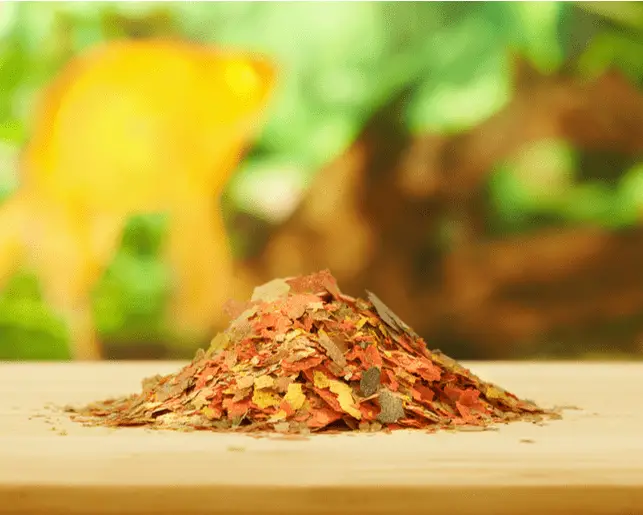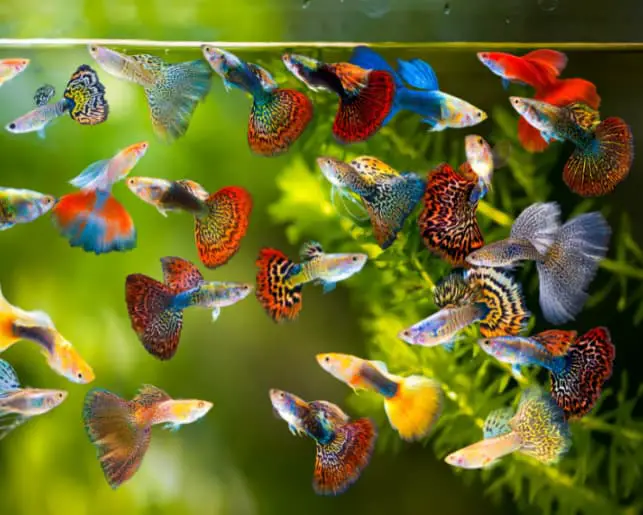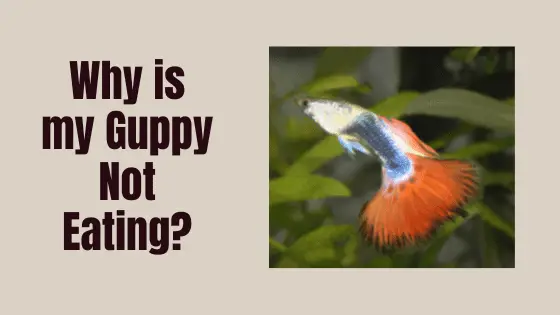Loss of appetite in a pet is never a good experience for any pet owner. If your guppy is not eating and the issue persists, you should get to the bottom of it as it could be a sign of deeper problems.
Your guppy may not be eating because of the quality of food, the tank environment, or the guppy’s condition. You can get your guppy eating again by analyzing its symptoms to narrow down the cause of inappetence and solve it.
Read on to see possible reasons for inappetence in guppies. I’ll also show you how to troubleshoot the loss of appetite and what to do to get your guppy eating again.
Food-Related Reasons for Lack of Appetite in Guppies.
If something is wrong with your food, your guppy may choose not to eat it. The two most common problems with guppy food is that it’s past its expiration date or is very low quality.
Let’s explore in more detail.
Expired Food
If you feed your guppies store-bought food, it may be easy to lose track of time. This may lead to you inadvertently giving your guppy expired food. When you feed guppies expired food, they’ll probably just nibble at it and reject it almost instantly.
Packed fish food is a semi-perishable product. Most packages have an expiry date–something that some fish owners overlook. It is thus easy to mistakenly feed expired products to your fish.
Expired food is a problem because it will likely have lost some of its nutrients, which may cause your fish to reject the food in the first place.
Poor storage could also cause food to lose its nutrients over time and be rejected by your guppy–even if it’s technically not expired. To avoid this, remember to close the food package and store it correctly every time you access the food package.
Additionally, to maintain the quality of your fish food, protect against the following factors, which accelerate the loss of nutrients:
- Heat. Keep food at room temperature or lower. When storing for the long term, refrigerate it.
- Water. Exposure to water can dissolve water-soluble vitamins. Avoid presoaking.
- Light. Keep your packaging closed to avoid exposure to light.
- Oxygen. Your food container should remain tightly closed.

Poor-Quality Food
The food you give to your guppy is supposed to provide it with specific nutrients that are essential to its health and well-being. If the food doesn’t have the required nutrients, your guppy might reject it.
You can get sub-standard food from dealers who sacrifice quality for affordability. Granted, the food will be cheap, but there’s a high chance it won’t be as nutritious as it ought to be.
Buy products from a reputable store to ensure you get high-quality feeds for your guppies.
Why Do Guppies Spit Out Their Food?
Guppies spit out their food because it’s excessively large or tough. Sometimes, they spit out food that they don’t like, likely because it lacks the nutrients they are used to tasting.
Ideally, you should feed your guppies food in small pieces that they can easily consume. Small pieces help since guppies have teeth towards the back of their mouths and crush rather than chew food. Guppies are less likely to spit out food that’s in small pieces.
You might also want to avoid tough food like pellets and instead feed your guppy flakes, which are easier for them to consume.
Tank Environment Reasons That Could Cause Reduce Appetite in Guppies.
If the conditions in your aquarium are not optimal, it could affect your guppy’s appetite. The following situations can negatively affect your guppy’s appetite:
- High ammonia levels.
- Suboptimal temperature.
- Inadequate male to female ratio.
- Bullying.
High Ammonia Levels
The level of ammonia in a fish tank can accumulate to dangerously high levels that could kill your guppies.
Aside from the loss of appetite, other signs of excessive ammonia levels include:
- Gasping for breath.
- Patches of blood on the guppy’s body.
- Staying inactive at the bottom of the tank.
- Lethargy.
- Gills turning purple or red.
If you notice the symptoms above, try isolating the cause of excessive ammonia and solving it. Possible causes include:
- Introducing too many fish into a tank at once.
- Using chemicals to kill off the bacteria in the fish tank. Beneficial bacteria help keep water safe by breaking down ammonia into harmless elements.
- A malfunctioning filter.
- The lack of beneficial bacteria in a new tank.
Suboptimal Temperature
Guppies are tropical fish and should not be placed in cold water. With that said, they can survive in a relatively wide range of temperatures.
Ideally, the water temperature in your guppy tank should be 72 – 82 degrees Fahrenheit (23 – 28 degrees Celsius).
Inadequate Male to Female Ratio
Guppy males can be pretty aggressive during mating season. If there are too many males in a fish tank, the females will be exhausted and might be too stressed to eat as they should.
The ideal ratio of guppy males to females in a fish tank is one male for at least two to three females.
Bullying
Guppies are peaceful and can coexist well not only with other guppies but also with other fish.
However, other species may not coexist well with guppies. If your fish tank has multiple species, and some display predatory behavior towards your guppies, it could lead to high stress levels and lower appetite.
If your guppy seems to be constantly avoiding other fish and looking for a place to hide, it’s probably being bullied.

Your Guppy Could Lose Appetite Due to Internal Factors.
Your guppy’s loss of appetite could also be due to internal reasons such as:
- Labour
- Stress
- Illness
Let’s take a closer look.
Labour
When a female guppy is pregnant, it is common for it to lose appetite in the run-up to labor. Since labor usually lasts for some hours, this should not be a major concern.
However, you can use the loss of appetite and other symptoms to identify a pregnant guppy and move her to another tank. This will help her give birth in an environment where she doesn’t have to worry about other fish.
Stress
A stressed guppy is likely to have low appetite. Causes of stress in a guppy include:
- Changing a guppy to a new tank. It can take time before the guppy adjusts and its appetite is back to normal.
- The introduction of new fish into a guppy tank.
- Inadequate male to female ratio.
- Bullying.
- Poor tank conditions such as temperature.
Illness
Diseases are another issue that can reduce the appetite of your guppy. Keep an eye out for other symptoms apart from inappetence to determine whether your guppy is sick.
Symptoms that could help you identify sickness include:
- The presence of spots on the guppy’s body.
- A bloated belly.
- Loss of skin.
- Unnatural swimming.
- Restlessness.
If you suspect your guppy’s inappetence is due to illness, consider seeking the help of a professional.
What Should Guppies Eat?
Guppies should eat high-quality commercial flake food supplemented by the occasional treat. Flake food has all the nutrients that guppies need. Additionally, it is easy to consume, unlike food pellets.
Every once in a while, it’s okay to treat your guppies by giving them high-protein foods like brine shrimp and bloodworms in low quantities.
Other occasional supplements that would be good for your guppies include:
- Veggie supplements with algae and plankton that are rich in minerals like iron and calcium.
- Spirulina tablets are rich in carotenoid pigments.
This short video is worth a watch.
How Long Can a Guppy Go Without Food?
An adult guppy can go without food for up to two weeks. Guppy fry (babies) can go without food for two days. As a rule of thumb, the more mature a guppy is, the longer it can go without food because it has more fat reserves to draw on for energy.
If your adult guppy has an appetite problem, you have enough time to figure out what the problem could be. There’s no need to panic. You can take some days to observe the guppy and try different solutions to restore its appetite.
Conclusion
Your guppy’s loss of appetite can be attributed to reasons that can be classified into:
- Fish tank related issues.
- Issues with the food you are giving the guppy.
- The guppy’s internal condition.
Narrowing down the problem and solving it will restore your guppy’s appetite.
Guppy Related Articles:
Will mummy guppy eat baby guppies?

